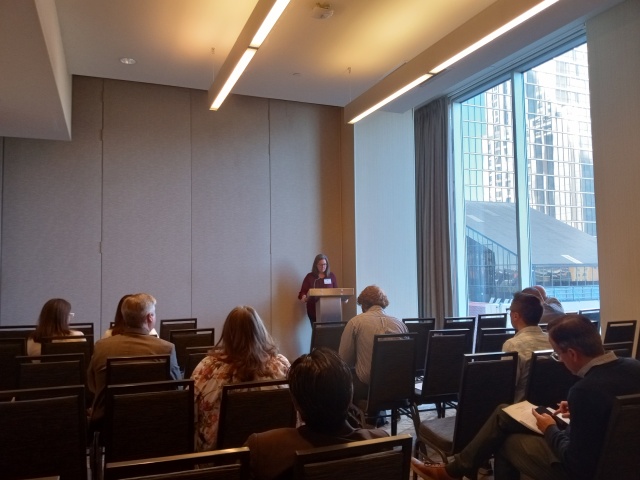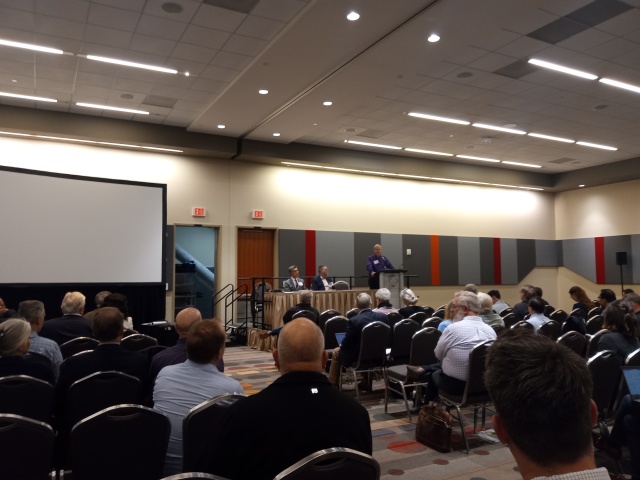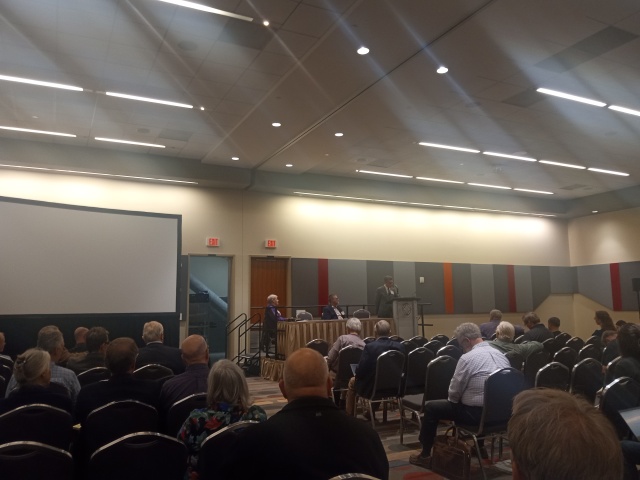This past week I had the opportunity to attend the annual meeting of the Evangelical Theological Society. (See my report on last year’s conference here.) This annual conference is a great time to hear about current research in biblical and theological studies and to catch up with friends and colleagues.
The theme of this year’s conference was “Theological Anthropology.” It was held in beautiful San Antonio, TX. Here’s a picture of the River Walk, a section of town that goes under the main level of town and has shops and restaurants that curve along the path of the river. The roads often cross over top (I’m standing on a bridge here). It’s lit up for the upcoming Christmas holiday.
I was able to stay in a hotel close by the conference center and walk there through town.
Papers and Presentations
I was able to hear a number of great papers.
1. Tuesday morning started off with a great paper by my friend Christy Thornton (pictured below) titled “A Baptismal Way of Thinking: Retrieving Irenaeus on Baptism for Contemporary Baptists.” Her presentation is a shortened form of her recent article in the Southeastern Theological Review, which you can read here.
2. The last of the Tuesday AM sessions I attended was a presentation by Kaspars Ozolins (pictured below) titled “Facilitating L2 input in Biblical Hebrew Pedagogy.” This was the first of several papers I heard that week on second language acquisition (SLA). I’ll talk abut this more in my summary below.
3. Tuesday afternoon I heard the paper “Towards a Taxonomy of Middle Voice in Koine Greek” by Jillian L. Ross (pictured below). Dr. Ross has been working on an OT commentary (Esther, I believe) and in her study of the LXX version has been looking at the use of the middle voice. If I understood her argument correctly, she was arguing that looking at the particular lexeme and the overarching clausal structure may provide a key to understanding the Greek middle voice.
4. This was followed by James Fickenscher (pictured below), who read his paper “What does Word Order Mean in New Testament Greek?” It was basically an introduction to his dissertation topic. He argued that in the Pastoral Epistles each book had a typical word order that was violated when the author seemed to be trying to accomplish certain pragmatic tasks (such as making a conclusion or transition).
5. I heard a couple interesting presentations on Baptist retrieval. Matt Emerson and R. Lucas Stamps made a presentation for the Center for Baptist Renewal entitled “Retrieval for the Sake of Baptist Renewal” (pictured below). After that, Shawn J. Wilhite and Coleman F. Ford gave a presentation for the Center for Ancient Christian Studies entitled “The Promise and Parameters of Theological Retrieval: Dogmatics, Patristics, and Method.”
6. The final session on Tuesday was by Leo Percer (pictured below) entitled “A Bumpy Road: Lessons Learned from Integrating Modern Language Methods to Teaching NT Greek.” This was the second session I heard on SLA this week.
7. Wednesday morning I heard a third paper on SLA. This one, by Brian Schultz (pictured below), entitled “From Deciphering to Reading: the Contributions of SLA,” was the most helpful because he went into some of the cognitive processes that go into reading, and how decoding (as practiced in Grammar-Translation pedagogy) never leads to reading because it does not progress to the level of automaticity.
8. After lunch on Wednesday, I thought I would go heard a discussion based on Doug Moo’s new book The Theology of Paul’s Letters. It was to consist of a short presentation by the author with reviews from Michael Bird, Tom Schreiner, Greg Beal, and Constantine Campbell. Sadly, the organizers did not plan this one well and put this session in a little room that was completely filled before I go there. There was a line of people trying to see over the heads of the people in back!
SO… instead I went to the doctrine of Scripture session. I heard C. John Collins (pictured below) give a paper called “Biblical Authority and Human Origins: Reading the Hebrew Bible.” He was trying to talk about what could and could not be said about human origins based on the OT.
9. After this, Guy Prentiss Waters (pictured below) spoke on the topic based on the NT affirmations about human origins, largely interacting with William Lane Craig’s recent work, In Quest of the Historical Adam: A Biblical and Scientific Exploration. His final evaluation was that Craig’s recent work, while important, does not adequately represent the NT witness to a historical Adam and Eve.
10. After this, two papers were given in absentia: Wayne Grudem, “Inerrancy Requires We Affirm Ten Doctrinally Significant Details in the Adam and Eve Narrative,” and Fred G. Zaspel, “Inerrancy, Adam & Eve, and B. B. Warfield.” The latter was interesting in showing that, although Warfield has been interpreted as holding to evolutionary origins for mankind based on statements of hypothetical openness, he remained skeptical and opposed to evolution throughout his life.
On this topic, there was also a session on Tuesday morning dedicated to the question of the historical nature of Adam and Eve, but I had other commitments and was not able to attend. Presentations were given by Kenton Sparks, William Lane Craig, Andrew Ter Ern Loke, and Marcus R. Ross.
The ETS Banquet was a great time to visit with people and meet new people. The speaker was Timothy George (pictured below, though he’s pretty tiny, lol), and his presidential address was titled “ETS at 75: A Community of Conviction and Love.”
Books
As always, I brought home new books. I found these really nice devotional books that go through the life of Jesus and the Psalms in 30 days. It is broken up into three readings per day and includes really nice prayers and confessions. I’ve been using the Life of Jesus volume and have found it really helpful.
I picked up a couple of Puritan works (Owen and Sibbes).
I found a great hardback copy of this children’s Bible. Catherine Vos was the wife of theologian Geerhardus Vos. We have read through this Bible with the kids in the past and found that it makes a perfect transition from story Bibles to the “real Bible.” It’s not a picture book, but a simplification of the biblical story that includes a lot of real details that other books skip over, but read with the big picture in mind.
I saw this set of fantasy books (maybe a modern attempt at Pilgrim’s Progress?) and picked them up for my voracious fiction readers at home.
Last year I had a delayed flight home, so this year I planned to leave Thursday morning. Good thing I did too, because my flight was delayed due to fog.
I made it home at 10PM, in time to get ready for work and get to bed.
Reflections
What a great time! I am so thankful to have gotten to go and see the people and hear the presentations! Here are some dear friends that I got to catch up with at the banquet. We were members of the same church in Wake Forest for years and part of the same small groups on and off.
Here are my reflections on the conference overall:
- After several years, I feel like I’m finally getting the hang of how to make the most of the conference. Here are some things I’ll do next year to better prioritize my time:
- I’ll prioritize scholars over papers. I have often gone to hear papers that sound good only to find out that they are not as good as they sound or not everything they promise. On the other hand, good scholars with good reputations are always worth hearing, even if you don’t agree with them.
- I’ll prioritize sections over individual presentations. Sections with numerous papers are often a good way to find people hanging out who have similar interests.
- I’ll be on the lookout to meet people who are doing things that I am interested in. While I don’t like networking or trying to promote myself with others, there can be genuine mutual value to finding people who are doing things that you are interested in and sharing ideas and resources.
- I’ll prioritize vocational interests (biblical languages, NT, etc.) and then important topics (important for Christian life or church ministry) over things I’m just curious about. Putting them in this order will help me focus on the most important things. I should work to clarify these categories as the next conference approaches.
- Things to look into:
- Center for Pastor Theologians. I had a great conversation with a brother on the flight to San Antonio in which he mentioned this group, which is working to leverage Ph.D.s for local church ministry.
- Center for Baptist Renewal. I’ve been aware of these folks for a while (they’re linked on my blog on the right side!), but it’s occurred to me that this group represents a move within Baptists that I am in line with and should investigate further.
- Second Language Acquisition. I mentioned above that I heard three presentation on SLA. Two of them cited the recent book by Jennifer Noonan called A Handbook of Second Language Acquisition for Biblical Studies: Insights of Modern Language Instruction for Teaching Biblical Languages. I’ve resisted the Living Language Approach to teaching the Biblical Languages because proponents are often dogmatic and inflexible. However, the presentations I heard this past week I found persuasive because they were less dogmatic and more focused on explaining how the brain processes language and how we can “hack” the brain to stimulate language learning for dead languages. It has already given me a lot to think about with regard to my middle school Latin students, and I’m looking forward to giving this more thought.
- Big picture thoughts: One final thing that I’m thinking about with regard to ETS in the future is what role my involvement should play in the big picture of my life.
- The honest reality is that there are very few jobs available in academia, and while my dream job would be teaching the Bible and biblical languages in a Bible college or seminary, It’s become increasingly difficult to see a way to get there from where I am now.
- Indeed, I have some concerns about the formative environment of academia at this time, even Christian academia. There are a lot of books being written and published right now that are just rehashing the same material with slightly different emphases. While I’m glad that this material is available, I questions whether so many of these books need to exist and wonder if we’re making the world a better place or simply marketing them to advance our own careers. In addition, there is a lot of pressure to present and to produce material, and as a result I see people presenting the same material over and over again, or simply presenting papers that aren’t really that good or important. Finally, there is a lot of pressure to be constantly self-promoting. Don’t get me wrong, I know lots of godly people who are doing good work and serving others, but I’ve been frustrated by trying to succeed vocationally in a system that often functions as I’ve described above.
- With all that being said, before next year’s conference, I need to do some thinking about what what role my membership in ETS and my attendance at the conferences plays in my life and calling. For the conference last week, I felt a bit conflicted. I was really thankful to have gone and had the opportunity to participate. To some degree, I feel like ETS is “my people.” On the other hand, I’ve invested a significant amount of life and resources in the pursuit of a career in academia and have received little return on my investment, which has left me a little disillusioned. I’m honestly not sure what to do with all these thoughts and feelings, but I need to get more clarity before I make the investment again next year.



















Interesting account, Noah. It sounds like the conference was at least beneficial in helping you to think about your future vocation. (I know one of your current students who thinks you’re the best!) I’m glad you got to spend time with old friends, too.
Lots of good observations, especially about scholars pumping out useless fluff and repeating themselves over and over in order to rack up the number of books, articles, and presentations that they’ve published/made. I think that has two very negative effects: 1) it tends to result in lower quality research/resources; 2) it gives all research/resources less staying power; everything becomes more and more ephemeral and non-impactful.